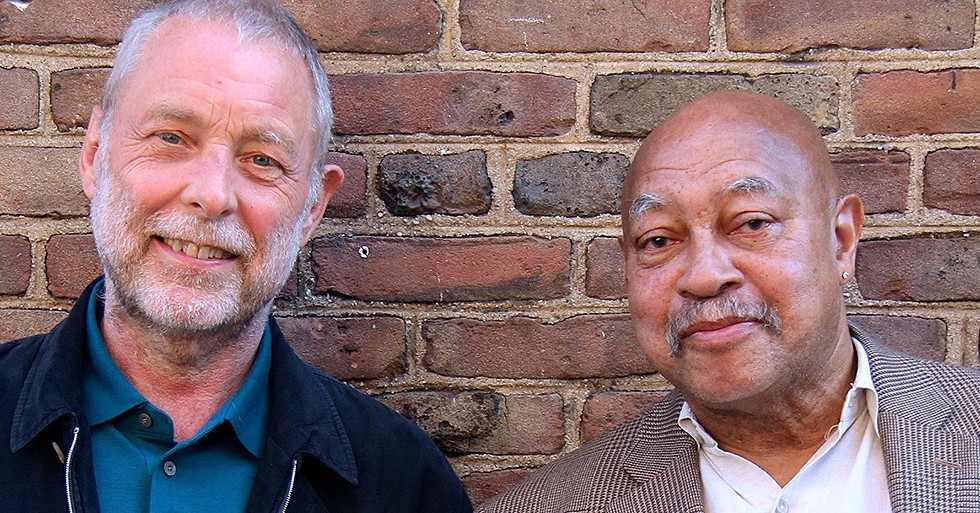
Pianist Kenny Barron and bassist Dave Holland sound so good together, you’d swear they’ve been working with each other for a lifetime. Their recently released album, “The Art of Conversation” (Impulse!), is a demonstration of their ability to challenge and inspire each other.
“Kenny and I eased into the whole thing of playing together,” says Holland of their two years spent exploring and refining their musical relationship, which will be showcased in a Symphony Center Presents Jazz Series concert Dec. 5. “We took time to feel out what was possible. It’s been a very gradual unfolding — a blossoming of the flower. Now we have a comfort and familiarity with one another that allows us much more freedom. We’re able to anticipate and understand what the other’s trying to do, and we find ways to support and complement it.”
“With Dave, there’s always interaction,” Barron says. “He doesn’t just play time and chords. He engages with me. We have this back and forth. It’s like a conversation.”
Indeed it is – an intimate and very musical conversation between the Philadelphia-born Kenny Barron, 71, who started on piano when he was 6, and British-born and -educated bassist Dave Holland, 68, whose first instrumental efforts were with a ukulele.
Listening to Barron is like watching Fred Astaire. He comes up with one captivating idea after another, and there’s an ever-present elegance and ease to it all. The Los Angeles Times named him “one of the top jazz pianists in the world,” and Jazz Weekly calls him “the most lyrical piano player of our time.”
Bassist Holland is a musical polyglot, a musician fluent in every form of jazz that’s emerged since the halfway point of the last century. Name any renowned jazz artist of the past 40 years, and Holland has likely played, recorded or collaborated with that performer at one time or another.
After performing in Paris, the two were approached by Jean-Philippe Allard of Universal Music France and asked if they’d be interested in a recording. They were, and the result was the critically acclaimed “The Art of Conversation.” While this first recording of their duo music-making was just released in October, the two have been bumping up against each other for several decades. In 1985, Holland appeared on “Scratch,” a Barron-led trio recording with Swiss drummer Daniel Humair. “Kenny and I had a great time playing together,” Holland says. “Every time we’d see each other backstage at a festival or at a hotel somewhere, we’d always say the same thing: ‘Oh, yeah, we’ve got to do it again!’ ”
Finally, their dream was realized. “Somebody had booked a string of duo concerts for us,” Barron says. “It just felt very natural.”
It may have felt natural. but duets are not easy. There’s no place to hide and both players have to be “on” all the time. Both Barron and Holland embraced the challenge. “We started slowly but we gradually gained momentum,” Holland says. “We’ve done two European tours already, a week in New York and several other concerts, and we’re about to come back and do Chicago and Los Angeles.”
“I think things are a lot looser now,” Barron says. “I can play with more self-assuredness and take more chances. That’s one of the things that happens when you play together a lot. Dave was commenting to me that normally, he doesn’t really solo that often. He might take two or three solos in a night. In this situation, he’s soloing in just about every song, but what’s nice is that Dave really knows how to fill up the space — without sounding over-busy.”
“In my own projects, I’m part of the band,” Holland says. “And I don’t feature myself any more than any other player in the band. So I take two or three solos in a concert, and that’s it. But in the duo, it’s just the two of us, and I’m playing solos in every tune. That’s much more of a workout for me. But you know, you learn to relax and not try to compensate for fact that there’s only the two of you. You don’t try to fill it all in. I don’t try to play all the parts that a drummer would play. It’s not so much trying to compensate – you learn to leave the space and have the kind of relaxed feeling that you’d have with the support of other instruments.”
They certainly have the support of their public. “I think the music’s really touched people,” Holland says. “We’ve had such positive responses not just to the recording — all the concerts have been sold out, and the people are just loving the music. It’s turned out to be a great project for us.”
Chicago-based writer Jack Zimmerman has authored a couple of novels, countless newspaper columns and was the 2012 recipient of the Helen Coburn Meier and Tim Meier Arts Achievement Award.